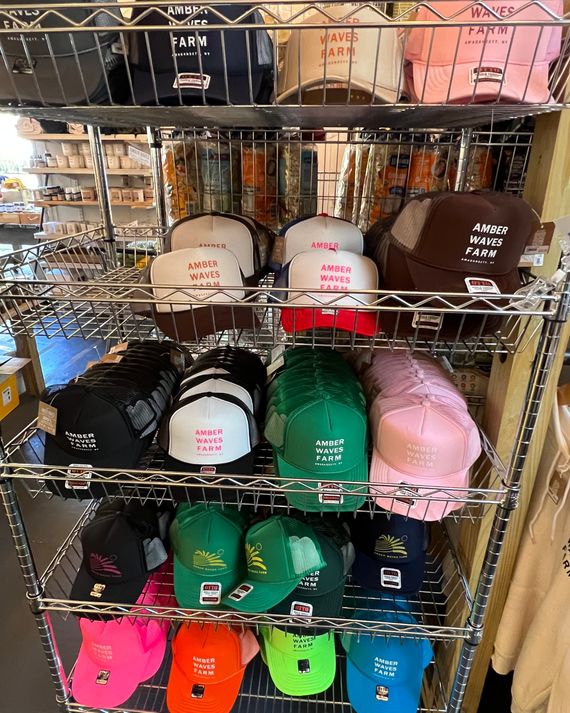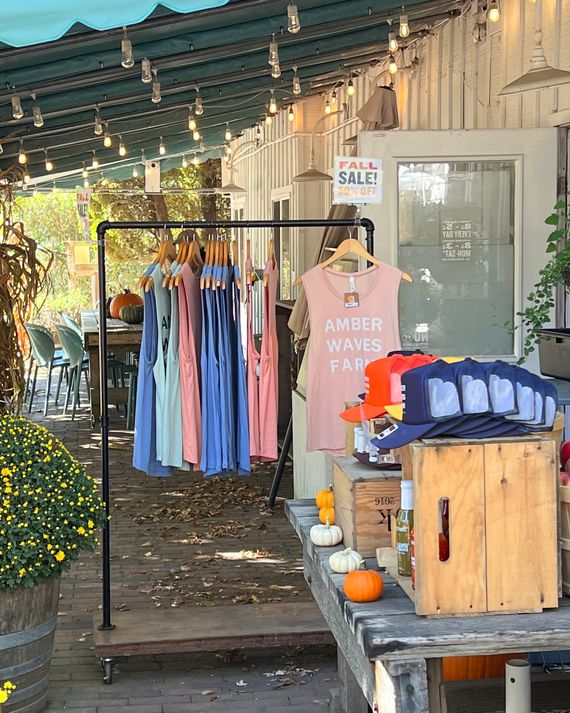It’s pumpkin-patch season, and even if you never set foot on the East End this fall, you may have seen the hat by now: in minimalist, sans-serif all-caps, it bears the words “AMBER WAVES FARM,” with the three words stacked on top of each other. Some will also note “AMAGANSETT, NY” in more demure type above the brim or on a sweatshirt or tee. Sightings of this small farm’s apparel happen from the Coney Island boardwalk to Smith Street to Park Avenue, especially the trucker hats, worn by everyone from Jenna Lyons on the Real Housewives of New York to your co-worker who rents a house in Sag every August. It’s the look for those who will immediately get that, yes, you were “out east,” without you ever having to say “the Hamptons.”
“They’re a West Side Highway epidemic,” says Madeline Briggs, a Tribeca-based interior designer. She’s enjoying a pumpkin patch in Water Mill with her friends, one of whom is wearing the hat.
That wearer is Sophie Menges, a Hamptons resident whose family runs the Monogram Shop, a local fixture for 27 years. “When you walk around Soho, Tribeca, East Village, every single person is wearing them,” she says. “When I’ve had people come visit, they’re like, ‘Can we go to Amber Waves to get the hat? I really want to get the hat.’”
Scotty Goldbeck, a mother of two in Pasadena and summer East Hamptonian, sees the hats at Memorial Coliseum and Griffith Park. “I saw an Amber Waves hat yesterday,” she says, recalling the USC game. “He wasn’t even in my section.”
“It’s become, in a weird way, kind of an iconic article of clothing,” says Goldbeck. It’s a way to say “not only have I been to the Hamptons, I’ve been to Amagansett. It’s the difference between a Gwyneth Paltrow–rich mom and your basic bitch in Chanel.” (Earlier this month, Blythe Danner herself told me, “Amagansett was the un-Hamptons. It wasn’t glamorous and that’s why I liked it.”) The hat is a more knowing fashion choice than the Kendall Roy–approved baseball cap you can buy in East Hampton Village at Loro Piana, set among the same retail mix you’ll find in Meatpacking or the Dubai Mall. Amagansett has no such flash; though, tellingly, it does have Ulla Johnson.
“There might be a cool factor associated with Amagansett,” says Amanda Merrow, Amber Waves’s co-founder. An element working in the farm’s favor has been celebrities like Ina Garten, who featured Amber Waves Farm on Barefoot Contessa as early as 2009. In the years since, Covid drove even more people to the East End. When they returned to the city, they brought back a sense of country pride that risks inducing eye-rolls. The trucker hat is an elegant workaround, since Amber Waves is a sustainable, women-owned, local nonprofit. It makes the hat the ideal harvest-season flex: I was out East, post-summer, for local produce and small-town living. The hat is available in gold and orange colorways, for good measure.


Merrow says, “Small farms are nimble. They’re gathering places, they’re employers, and they feed people. And so having a culturally relevant, proactive farm in a community, I think is really meaningful.”
This small farm has sidewalk frontage on Highway 27, the Hamptons’ main artery, which jibes with its founding mission to engage future farmers and the public alike. As a teaching farm, it’s open year-round and there’s no admission to get onto the property. It runs an apprentice program and 17 of its former employees and apprentices have founded their own farms. Merrow sees this as critical to an industry where the average age is 58, while, she tells me, the U.S. is losing farmland the size of Rhode Island every year.
When Merrow and her fellow co-founder, Katie Baldwin, started, the two of them worked a single acre themselves. They sold eggs on the honor system. They wore the free hats that came with their tractors from Wengers of Myerstown — until people thought the farm was named Wengers.
Perhaps to the horror of graphic designers everywhere, Baldwin went into Microsoft Word and created a JPEG of what they would call the Triple Stack — the three-word text logo. That trucker hat is their top apparel seller: approximately 6,000 per year now, and most of those are brick-and-mortar sales.
Amber Waves now owns the ten acres around the market, leases an additional 25, and is currently looking for more. It employs 40 year-round staff, mostly women, with dozens more in the height of the busy season. “Our original customers miss those quiet and quaint days,” says Merrow, “but it would have been hard for us to be sustainable and stay on that level.”
When I meet Merrow at the farm stand, it’s a breezy October day and the outdoor tables are mostly occupied with clientele who seem more interested in Golden Goose than actual fowl. Others peruse the market, examining pickle jars, baby bok choy, and, of course, hats.
Originally global-food-policy wonks, Merrow and Baldwin found each other at an apprenticeship at nearby Quail Hill Farm. They loved the dirt and seeing literal fruits of their labor. Their original business germ was to focus on the underappreciated wheat crop — hence Amber Waves. They’ve since diversified to 500 varieties of 60 crops, and donated over 25,000 pounds of it to locals experiencing food insecurity this year. “One of the reasons that I see a future in small sustainable ag is that farms just have the opportunity to answer their own local population’s challenges,” Merrow says. It’s unlikely most people wearing the hats are thinking about that as they jog past Little Island or sip bottomless mimosas at brunch, but it’s an ethos that blunts the effect of saying you were in the Hamptons.
“I have noticed in an airport somebody wearing an Amber Waves Farm hat, and it always gives me a little warm, cozy feeling,” says Rachel Fleit, a filmmaker and homeowner in Springs, the nearby village where more residents tend to live year-round. This is where Merrow also lives.
But Fleit doesn’t own a trucker hat, despite shopping frequently at Amber Waves, because it feels like a souvenir. “If I was not local, or not a year-round resident, I would totally want the trucker hat.”
When people see the hat, Merrow wants them “to think about knowing their farmer and remembering that everything that you eat every day came from a farmer or a fisherman. There are people behind that food.”
Merrow shows me a newer hat designed by one of Amber Waves’s own farmers: It’s a hat that shows a goat wearing the Triple Stack trucker hat. “We don’t take ourselves too seriously,” she says.